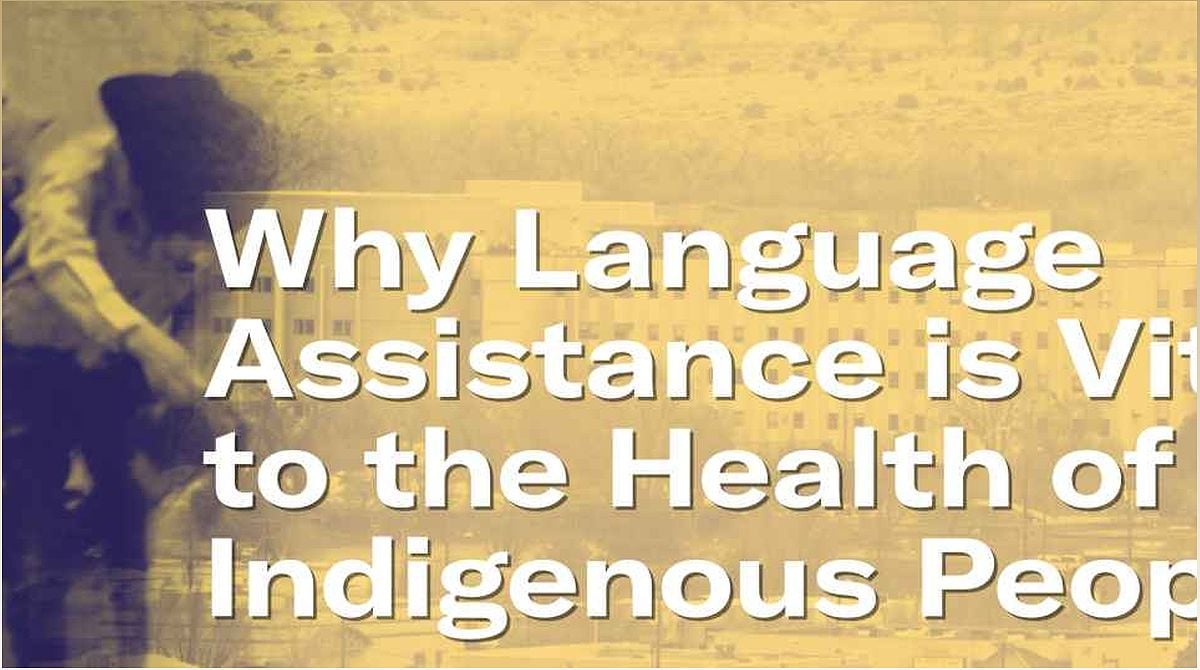The Importance of Language Assistance for Indigenous People
In this interview, Senior Indigenous Justice Staff Attorney Preston Sanchez emphasizes the significance of language assistance for Indigenous individuals. The conversation stems from a lawsuit against San Juan Regional Medical Center (SJRMC) for their failure to provide a certified Navajo language interpreter to Navajo elder Larry Williams, resulting in misdiagnosis and subsequent death. Explore the need for interpretation services, legal standards, and the impact on Indigenous communities.
The Tragic Consequences of Language Barriers
Navajo elder Larry Williams’ tragic case highlights the dire consequences of language barriers in healthcare. San Juan Regional Medical Center’s failure to provide a certified Navajo language interpreter resulted in misdiagnosis and ultimately, his death. This case sheds light on the urgent need for language assistance for Indigenous individuals.

When Larry Williams was taken to SJRMC, the medical staff did not consider his language needs or provide him with a Navajo interpreter. As a result, they failed to recognize his altered mental state, a common symptom of sepsis. Instead, he was treated for a urinary tract infection and discharged. Sadly, his condition worsened, and he passed away two days later.
Indigenous individuals, like Larry Williams, often face significant challenges when seeking healthcare due to language barriers. It is crucial for medical institutions to provide language assistance to ensure effective communication and accurate diagnoses.
The Need for Interpretation Services
Native elders, who primarily speak Indigenous languages, face unique challenges when accessing healthcare. In New Mexico, where there are 23 tribal nations and seven different Native languages spoken, the need for interpretation services is paramount.
Larry Williams’ case exemplifies the importance of interpretation services. His daughters, who were not fluent in Navajo, were unable to effectively communicate with the medical staff during his hospitalization. Medical terminology is complex, and even individuals with some knowledge of the language may struggle to understand it.
Interpretation services play a crucial role in bridging the language gap between medical staff and Indigenous patients. By providing certified interpreters, hospitals can ensure accurate communication, proper diagnoses, and ultimately, better healthcare outcomes.
Legal Standards and Language Assistance
Legal standards have been put in place to protect the rights of limited-English patients and ensure they receive adequate language assistance. These standards apply to healthcare institutions across the United States, including hospitals like SJRMC.
In Larry Williams’ case, SJRMC failed to comply with these legal standards by not providing a certified Navajo language interpreter. The medical staff’s lack of awareness of the term ‘Limited-English Proficient’ and the policies requiring language assistance raises concerns about systemic issues in hospitals across New Mexico.
It is essential for hospitals to be held accountable for fulfilling their legal duty to provide language assistance. By doing so, they can ensure that all patients, regardless of their language proficiency, receive the care they deserve.
The Impact on Indigenous Communities
The loss of a traditional elder like Larry Williams has a profound impact on Indigenous communities. These elders hold invaluable cultural knowledge and play a vital role in passing down traditions and teachings to future generations.
Language barriers in healthcare not only hinder effective communication but also perpetuate a cycle of cultural erasure. When Indigenous individuals are unable to express their symptoms or understand medical instructions, their health outcomes suffer, and their cultural heritage is further marginalized.
By recognizing the importance of language assistance and implementing policies to address language barriers, hospitals can contribute to the preservation of Indigenous languages, cultures, and the overall well-being of Indigenous communities.
Raising Awareness and Ensuring Accountability
Larry Williams’ case serves as a wake-up call for New Mexico hospitals to prioritize language assistance for Indigenous patients. The diverse linguistic landscape of the state, with 23 tribal nations and seven Native languages, demands immediate action.
It is crucial to raise awareness among medical staff about the legal obligations and the importance of providing language assistance. By doing so, hospitals can ensure that Indigenous patients receive equitable healthcare and that tragedies like Larry Williams’ are prevented.
Accountability is essential in holding hospitals responsible for fulfilling their duty to provide language assistance. By implementing comprehensive language access policies, training medical staff, and monitoring compliance, hospitals can create a healthcare system that is inclusive and culturally sensitive.
